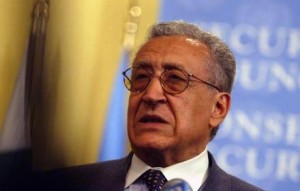 TEHRAN, Jan. 28 (MNA) � Syrian peace talks in Geneva were deadlocked after a session Monday aimed at tackling the explosive issue of a transfer of power, delegation sources from the warring sides said.
TEHRAN, Jan. 28 (MNA) � Syrian peace talks in Geneva were deadlocked after a session Monday aimed at tackling the explosive issue of a transfer of power, delegation sources from the warring sides said.The sources said the talks had broken up with no progress after the Syrian government delegation set out a statement of principles aimed at preserving state institutions and stopping the threat from "terrorist" groups, AFP reported.
The opposition rejected the statement, saying talks needed to focus on a political transition, and UN mediator Lakhdar Brahimi ended the session, the sources said.
As the meeting got under way, the government delegation put forward a paper focusing on the need to combat terrorism and halt funding and shipments of weapons to rebels fighting to topple Assad, delegates said, according to AP.
Both sides said the opposition rejected the paper, and the opposition said it insisted on talking about a transitional government as scheduled.
Brahimi broke up the meeting and was scheduled to meet with both sides separately later Monday.
The Syrian government has said it will not discuss replacing President Bashar Assad as the leader of a country his family has ruled since 1970.
The opposition insists he must step down in favor of a transitional governing body with full executive powers that would lead the country until elections are held.
Brahimi, managed to get both sides to sit in the same room over the weekend to discuss humanitarian aid to besieged areas of the besieged central city of Homs and a possible prisoner exchange. But the opposition said little progress has been achieved.
On Sunday, after three days of talks, a tentative agreement was reached about the evacuation of women and children trapped in Homs before aid convoys go in.
On Monday, the two delegations were supposed to begin discussing thorny political issues such as Syrian Presidnet Bashar al-Assad's future.
The inability of the two sides to discuss Assad's future was expected.
Syria has said any discussion of a transitional government excluding Assad would cross "a red line."
Regarding Homs, officials said the women and children there should decide whether they want to leave or stay after they have received aid.
He accused authorities of blocking a convoy of 12 trucks trying to get into the embattled city and said, "We will judge the regime by what it does, not by what it says."
Syrian state TV said a Syrian official and a U.N. representative were meeting in Homs to discuss how to evacuate women and children from rebel-held areas there. It was unclear when the evacuation would start.
Homs Governor Talal Barrazi said the only obstacle facing the flow of food into rebel held areas are "some cases of snipers fire by terrorist groups."
By Mehr News Agency�
The Iran Project is not responsible for the content of quoted articles.










